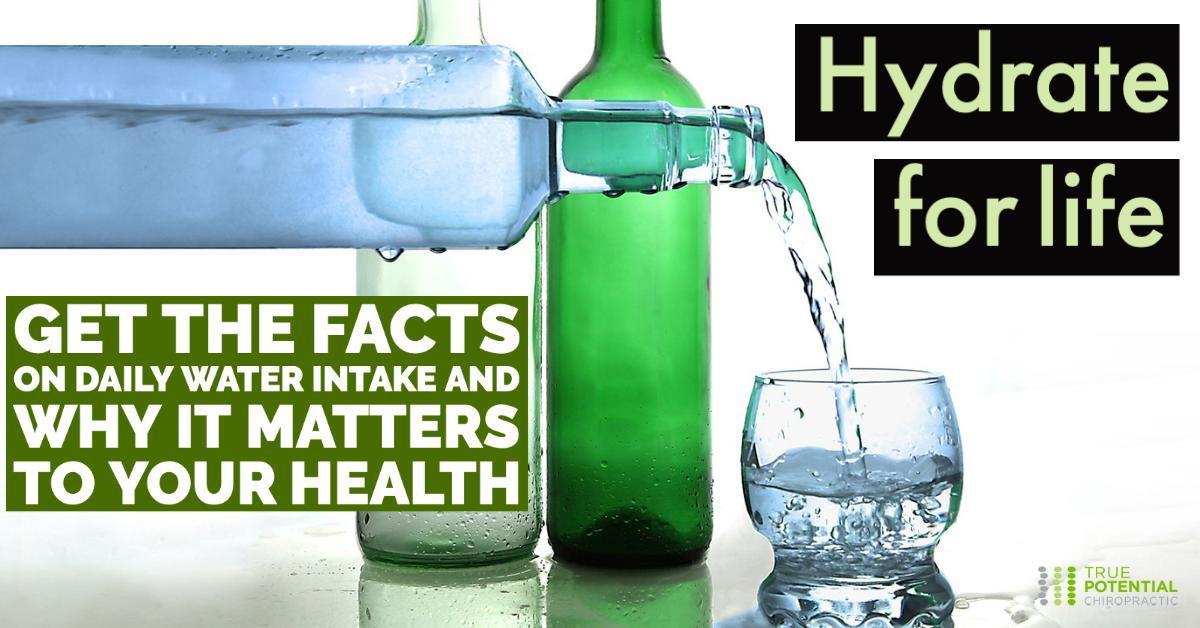
Get the facts on daily water intake and why it matters to your health
You've heard it time and time again – make sure you drink enough water. Most of us know we are probably not drinking as much water as we should be. But we may not know how big of impact dehydration can have on our brain and body functions. We also might not be clear on how much water is enough to stay properly hydrated.
Knowing your minimum water requirement, what benefits you gain from proper hydration, and what you risk when you're not partaking enough in the "elixir of life" might give you the motivation you need to stay on top of this vital health consideration.
What is too little water for health, and what is too much
If you’re an average adult drinking less than two liters (approximately eight and a half cups) of water a day, you're not getting enough. Aim to get at least three liters (about 13 cups – that's 104 ounces!) for optimal health. Another way to think of this is roughly one gallon of water a day, or half as many ounces as your total body weight.
Caffeine, alcohol, a dry environment, smoking and vaping, breathing, vigorous activity, singing, urination, consuming dry and absorbing foods like jerky and bread all contribute to decreasing your body's hydration levels. Keep that in mind as you balance your hydration needs.
Don't forget, you do get hydration benefits from the food you eat and other liquids you drink, but nothing beats straight-up H2O. A special note on sparkling water – it's not as beneficial as regular tap or filtered water. Sparkling water has a highly acidic nature and can contribute to tight and tense muscles in athletes. Additionally, a recent study conducted mainly on rats and some humans has found that even unsweetened, sodium-free, calorie-free bubbly water may promote weight gain.
Drinking too much water can lead to water intoxication. It's pretty rare to drink enough water for water intoxication by accident. It tends to develop more commonly amongst endurance athletes and soldiers. The symptoms of water intoxication are general — they can include confusion, disorientation, nausea, and vomiting.
In rare cases, water intoxication can cause swelling in the brain and become fatal.
Some sources recommend drinking no more than 0.8 to one liter (approximately four cups) of water per hour to avoid water intoxication.
Caffeine, alcohol, a dry environment, smoking and vaping, breathing, vigorous activity, singing, urination, consuming dry and absorbing foods like jerky and bread all contribute to decreasing your body's hydration levels.
Risks of not drinking enough water
- Slow movement and reaction times
- Strained movement
- Rigidity leads to easy injury
- Slow circulation
- Sensations of achiness, tightness, and creaky joints
- Mental and physical fatigue set on quickly
- The emotional state tends to lean toward depressive and self-pitying
- More frequent UTI’s
- Decreased immunity
Benefits of drinking enough water
- Fluid movement and quick reaction times
- Effortless movement
- Flexibility lends to injury prevention
- Vascular appearance and good tissue perfusion
- Sensations of overall wellness and accessible wide ranges of motion
- Mental and physical stamina can be rigorous
- The emotional state tends to lean toward happiness and contentment
- No to little UTI’s
Jack and Jill went up a hill to drink a pail of water (be like Jill)
Let's compare Jack, a dehydrated individual, to Jill, a hydrated individual.
Jack wakes up tired and groggy and hits the coffee before anything else to feel functional. Coffee causes frequent urination, and the brain is slow and foggy, triggering more caffeine intake. Jack might continue to drink "healthy" tea or seltzer throughout the day as hydration. He experiences a morning and afternoon "slump" after eating. A post-work trip to the gym results in a rapid "feel the burn" level of exertion, and his joints and muscles are stiff. A glass of wine with dinner is followed by falling into bed exhausted.
Jill, on the other hand, rolls out of bed alert and well-rested. She starts the day with a glass of water and may not want or need much caffeine to feel "normal." Jill doesn't experience a post-breakfast or lunch slump because she is hydrated enough for her digestive organs to work correctly. Jill enjoys a frequent "bottle" of water (about two cups or 16 oz) throughout the day and with meals. She hits the gym with energy and has excellent stamina and flexibility for her workout routine. Jill can still enjoy a glass of wine, but she will wake with no adverse effect because of her optimal hydration habits. By the end of the day, Jill has ingested approximately 70 ounces of water, or half her 140lb body weight.
The drawback of getting enough water
Is there any drawback to hydrating yourself optimally? Yes. Just one. You’ll probably have to hit the restroom more frequently. However, given all the benefits you now know, we expect you’ll think that’s worth the tradeoff! So be like Jill, not like Jack, and you’ll be on your way to living your life to its True Potential.

